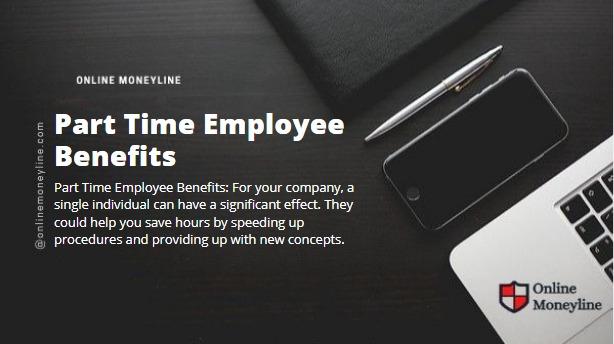Part Time Employee Benefits: For your company, a single individual can have a significant effect. They could help you save hours by speeding up procedures and providing up with new concepts. Even an internee doing an internship in your company can save you a lot of time and money.
Several regulations oblige companies to provide some advantages to employees who work part time. Part-time workers might also be required by national and local government authorities to receive advantages including compensated medical leave, short-term incapacity, or healthcare schemes or insurance rates.
To assure conformance, companies should review the rules in each region wherein they hire employees. Make sure that your staff gets the part-time employee rights too.
Who Is A Part-Time Employee?
According to the IRS, workers who spend a minimum of 30 hours every week, or 130 hours monthly, are regarded as full-time jobs.
These working hours are recognized by the IRS for purposes of the Affordable Care Act (ACA). A full-time job, as per the IRS, is defined as working for 30 to 40 hrs weekly.
According to the IRS criteria, part-time workers spend approximately thirty hours every week. Employees could also be professionals who operate between 1 and Thirty four hrs per week, according to the BLS.
The distinction between working part time and working full time
The fundamental distinction between part time and full time jobs is their weekly planner. The part-time workers spend fewer hours as compared to full-time workers.
Apart from that, the FLSA makes no distinction among the permanent employees working as full time and temporary employees working as part time. These requirements aren’t determined by the organization.
Organizations will also be aware of other rules that may determine what constitutes part-time work.
The benefits and drawbacks of recruiting part-time employees
When your company is developing but you don’t have the economical resources to recruit full-time workers, hiring part-time workers might be a less expensive approach to fulfill needs.
In deciding if or not to hire more people, think about the below mention benefits of recruiting part-time employees:
- Complete employment vacancies and provide extra services to permanent or long-term employees.
- Increase the scope of your hiring attempts by getting into a skilled working population you might have neglected before.
- Allows you to handle temporary requirements with greater adaptability. This could be beneficial to enterprises such as general merchandise marketing that require extra assistance throughout the festive season or frozen dessert companies that experience a surge in sales throughout the summer season.
Appointing part-time employees does not seem to be always a good idea. There are possible disadvantages to any of it, which could involve:
- Part-time employees mostly do not interact regularly with full-time colleagues as frequently, making participation and professional partnerships extremely complicated.
- As full-time workers spend more time as compared to part-time workers, full-time personnel may be dissatisfied with the burden disparity.
- Since tasks might begin or conclude after group participants of part-time staff are not operating, and they might have to pay attention, the specification of items may not have been up to standards (which can create difficulty for production).
Are Part-Time Employees Entitled To Benefits?
it relies on organizations and their policies about the benefits of employees. There are some businesses that provide part time employee benefits to their employees.
These include only mandatory advantages such as health insurance, welfare, disability insurance(for limited time), and pension plan. Small enterprises have some flexibility so they make their own policies for providing benefits to their part time employees and this also happens in the regions where governmental laws are strictly implemented.
Part-time workers may be drawn away from the competition by a compensation plan, which can assist boost their involvement in an organization. You must first recognize part-time jobs when evaluating part time employee benefit.
What are the advantages of working part-time?
The act of fair labor standards does not really specify if part-time workers should be entitled to the same advantages as full-time workers. Employers can usually decide the benefits (insurance, overtime pay off, retirement programs) to provide part-time workers, and also the criteria for obtaining them (e.g., length of service with the company).
Following are some of the part time employee benefits:
1) Retirement plans
401(k) strategy makes it possible for part-time workers to join offered by their employer. Part-time workers may be obliged to participate in qualifying retirement plans, such as designed retirement plans [401(k)], in accordance with the Employee Retirement Income Security Act (ERISA).
Part-time employment’ qualifying for retirement accounts may be based on their working hours, just as their healthcare insurance benefits. According to the internal revenue service ERISA and IRS a strategy might demand work for over one thousand hours in about 12 months in order to be qualified to enroll.
Employers must provide long-term part time employee benefits and employees have access to 401(k) plans under the SECURE Act. To be qualified, these workers must put in at most 500 hours a year for three years in a row.
Starting in the first month of the year 2021, hours must be tracked, therefore an extended underemployed individual’s first year of contribution will be Jan 2024. Employee deferred eligibility is the only criteria that applied; employees could now get removed from workplace pension allocation.
2) Healthcare Coverage
Since we all know that insurance coverage is provided to workers who work as permanent employees, employees who work as temporary or part time may be denied coverage. Extending such benefits, on the other hand, could be viewed as a bonus for working. A company must include part time employee benefits in their policies which comprise health insurance benefits.
Employers aren’t required to provide medical insurance under the Affordable Care Act (ACA). Staff members or workers who are above the age of fifty, full-time comparable employees must provide accessible and efficient medical coverage to permanent workers and their families under ACA’s employer shared responsibility (ESR) provision, or face a tax assessment.
A full-time employee is defined as someone who works 30 or even more hours weekly or one hundred and thirty hrs each month for ESR reasons.
Do Part-Time Employees Get Health Benefits?
If your small company has 50 or more full-time comparable employees, you must provide health insurance.
According to HealthCare.gov, therefore, you aren’t compelled to provide healthcare coverage to your part-time employees.
However, if you really want to, you could choose to provide medical insurance to part-time employees.
3) Overtime laws
For all working hours beyond 40 per week, the FLSA mandates that covered firms pay – anti employees at least one and a half hours their regular rates of compensation.
For example, if such an employee is paid $10 an hour on weekdays, any labor done over forty hours in that week should be paid at least $15 per hour, provided no further compensation is paid.
Are Non-Professional workers compensated on vacations?
Employees are not required to get holiday pay. When you decide to give full-time employees paid vacations, you may want to consider giving part-time staff holiday compensation as well.
This, too, will be determined by the policy you create. Perhaps you decide to pay part time employee benefit less during the holidays as compared to full-time workers.
For instance, you might give your part-time employee half-day holiday compensation and your full-time employee a full day of paid holidays.
If the hours worked are genuinely extra hours, the national wage and hour act does not require employees to be paid more for working holidays or Fridays.
If part-time or full-time workers are paid an extra amount of cash for holidays and weekends, state and local government laws, as well as corporate policy, may apply.
4) Unemployment benefits
Unemployment benefits are available for those individuals who work less than full-time workers in the region where the firm is located. The total amount of hours spent in the previous year, the income earned during that time frame, or whether or not they had suspended, terminated, or leave off all factor into whether or not the part-time employee gets unemployment benefits.
It’s possible that a business owner will have to participate in the joblessness scheme of the government as well to add unemployment in the part time employee benefit policies.
5) Fringe benefits
A company must provide part time employee benefits to each member of the staff working as a part-time employee. A broad range of less-expenses perks may be appropriate for part-time staff of your firm.
Individual and unwell days, incomplete severance pay, a fitness & wellbeing allowance, teleworking alternatives, or even ticket holders to sports activities are examples of fringe benefits that are usually included in every employee’s income.
Part-Time Employees Benefits Philippines
Employers can reduce the daily salary and wage-related benefits provided by law proportionally based on the number of working hours, although part-time workers can retain their bonus, holiday pay, and thirteenth monthly pay rights.
In the Philippines, part-time employees are also eligible for pension benefits.
Part-Time Employee Benefits California
In California, you will find part time employee benefits that are very helpful in the financial aid of employees.
- Part time employee benefits of unemployment are available to those who are unemployed.
- financial help to employment on a short term basis
- They are unemployed for absolutely no fault of their own.
- Who fulfill the qualifications set forth by the state of California.
Who will get Unemployment Insurance in California?
You have to be a California citizen and satisfy each one of the following requirements to be qualified for this benefit program:
- Unemployed and working in California for the previous 12 months (in some circumstances, this period could be greater).
- Received a set amount of money based on California requirements.
- You are accruing rewards by actively pursuing a job every week.
1000 Hour Rule For Part-Time Employees
Employers frequently recruit new hires because it is quicker and less costly than hiring a regular employee and giving benefits in addition to a salary.
However, withholding benefits to temporary employees because of their temporary residency can place businesses in breach of the Employee Retirement Income Security Act (ERISA), a national statute that sets basic requirements for pension and welfare benefit programs in the private sector to safeguard workers engaging in them.
Known as the 1000-hour rule, temporary employees are eligible for part time employee benefit, like health insurance and retirement funds, when they have worked at least 1,000 hours, or around 20 hours each week, over a year.
The “1,000-hour rule” of the Employee Retirement Income Security Act (ERISA) governs part-time employee qualification to enroll in a corporation’s retirement savings plan. Workers who have worked 1,000 hrs in 12 months are eligible to join any company pension available to other employees.
All full-time and part-time employees must comply with this rule.
Violations of this legislation can result in substantial fines for businesses as well as possible legal action.
Do Part-Time Employees Get Benefits At Amazon?
Furthermore, even though your operating part does not indicate you won’t be eligible for advantages, Amazon workers who spend 20 hours or more every week are qualified for advantages such as living, illness, dental, and optical treatment with Amazon paying the entire cost and providing funds for healthcare coverage.
Needless to note, if you’re a student—or considering participating in advanced schooling Amazon’s Choice program would cover 95percent of your college fees, allowing you to obtain a degree in an elevated, high-wage field like aviation engineering desktop designing, industrial machinery technology, or even pharmacy, to list some.
Companies With Best Benefits For Part-Time Employee
If you are looking for firms that provide part time employee benefit then you must go through these companies. The following are some of the companies who offer part-time jobs as well as benefits:
Final words
In this digital era, most firms need part-time employees to run their organizations. Many people prefer part-time jobs to full-time jobs because of their flexibility.
Part-time jobs have also benefits as full-time jobs up to somewhat. If you are looking for part time employee benefit then you must work in a company who have included these in their policies.
I’m also working as a part-time employee and enjoying some of the benefits like bonus, and holiday pay. Before entering a company you must read about their policies whether they have added part time employee benefit or not.
Check out part-time night jobs and stay-at-home jobs.

Author: Adila Z.
Google & Hubspot certified professional copywriter with a specialization in blogging and copywriting writing. Being the owner of 6 websites and 1 digital marketing agency, her expertise in online entrepreneurship is second to none.




